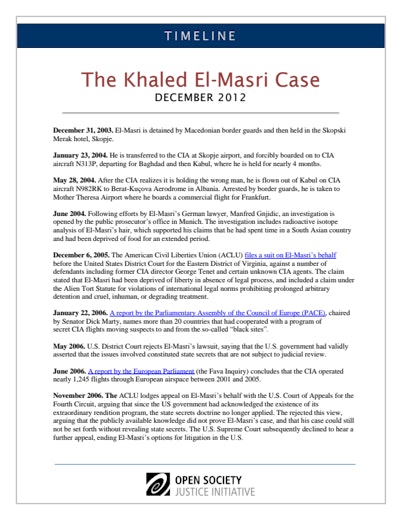Timeline: The Khaled El-Masri Case
December 31, 2003. El-Masri is detained by Macedonian border guards and then held in the Skopski Merak hotel, Skopje for more than three weeks.
January 23, 2004. He is transferred to the CIA at Skopje airport, and forcibly boarded on to CIA aircraft N313P, departing for Baghdad and then Kabul, where he is held for nearly 4 months at the notorious detention center known as the “Salt Pit.”
May 28, 2004. After the CIA realizes it is holding the wrong man, he is flown out of Kabul on CIA aircraft N982RK to Berat-Kuçova Aerodrome in Albania. Arrested by border guards, he is taken to Mother Theresa Airport where he boards a commercial flight for Frankfurt.
June 2004. Following efforts by El-Masri’s German lawyer, Manfred Gnjidic, an investigation is opened by the public prosecutor’s office in Munich. The investigation includes radioactive isotope analysis of El-Masri’s hair, which supported his claims that he had spent time in a South Asian country and had been deprived of food for an extended period.
December 6, 2005. The American Civil Liberties Union (ACLU) files a suit on El-Masri’s behalf before the United States District Court for the Eastern District of Virginia, against a number of defendants including former CIA director George Tenet and certain unknown CIA agents. The claim stated that El-Masri had been deprived of liberty in absence of legal process, and included a claim under the Alien Tort Statute for violations of international legal norms prohibiting prolonged arbitrary detention and cruel, inhuman, or degrading treatment.
January 22, 2006. A report by the Parliamentary Assembly of the Council of Europe (PACE), chaired by Senator Dick Marty, names more than 20 countries that had cooperated with a program of secret CIA flights moving suspects to and from the so-called “black sites”.
May 2006. U.S. District Court rejects El-Masri’s lawsuit, ruling that the U.S. government had validly asserted that the issues involved constituted state secrets that are not subject to judicial review.
June 2006. A report by the European Parliament (the Fava Inquiry) concludes that the CIA operated nearly 1,245 flights through European airspace between 2001 and 2005.
November 2006. The ACLU lodges appeal on El-Masri’s behalf with the U.S. Court of Appeals for the Fourth Circuit, arguing that since the US government had acknowledged the existence of its extraordinary rendition program, the state secrets doctrine no longer applied. The court rejected this view, arguing that the publicly available knowledge did not prove El-Masri’s case, and that his case could still not be set forth without revealing state secrets. The U.S. Supreme Court subsequently declined to hear a further appeal, ending El-Masri’s options for litigation in the United States.
January 31, 2007. The German prosecutor’s office issues international arrest warrants for thirteen CIA agents allegedly involved in El-Masri’s abductions, but declines to make the names public. The names emerged from a separate Spanish investigation into the use of Palma de Mallorca airport by CIA flights; they were provided by a Spanish investigative journalist, Mattias Valles, from the register of hotels used by the crew of the flight which was used to fly El-Masri out of Skopje. Following pressure from the U.S. administration, the German government declined to seek the extradition of the suspects from the United States.
June 7, 2007. A second report by the Parliamentary Committee of the Council of Europe (PACE) asserts that Poland and Romania hosted secret CIA prisons between 2003 and 2005.
April 9, 2008. The ACLU files a petition with the Inter-American Commission on Human Rights on El-Masri’s behalf. The United States declines to respond.
October 2008. Criminal complaint filed with local Macedonian prosecutor against unnamed Ministry of Interior officials for torture and illegal deprivation of liberty.
January 22, 2009. Civil claim for damages filed against the Macedonian government.
June 18, 2009. An investigation by the German parliament concludes that El-Masri’s account was credible, while the official version given by the Macedonian government—that El-Masri voluntarily left the country by crossing the border into Kosovo—was “clearly incorrect”.
September 21, 2009. A complaint is filed with the European Court of Human Rights (ECHR) on El-Masri’s behalf by the Open Society Justice Initiative, claiming violations of the right not to be tortured, the rights to liberty and family life, and the right to the truth.
October 8, 2010. The European Court formally communicates the case to Macedonia, and asks the government to respond to El-Masri’s claims by late January 2011.
January 24, 2012. The El-Masri case is passed upwards to the Grand Chamber of the ECHR, the 17-judge chamber which focuses on exceptional cases of human rights law.
May 16, 2012. Hearing before the ECHR’s Grand Chamber. James A. Goldston, Darian Pavli and Rupert Skilbeck of the Open Society Justice Initiative present El-Masri’s case (click here for webcast).
December 13, 2012. The European Court of Human Rights rules that Khaled El-Masri's story of mistaken rendition and torture by the CIA was established "beyond reasonable doubt."
Topics
- Climate Justice
- Digital Rights and Fair Elections
- Discrimination and Racial Justice
- International Crimes
